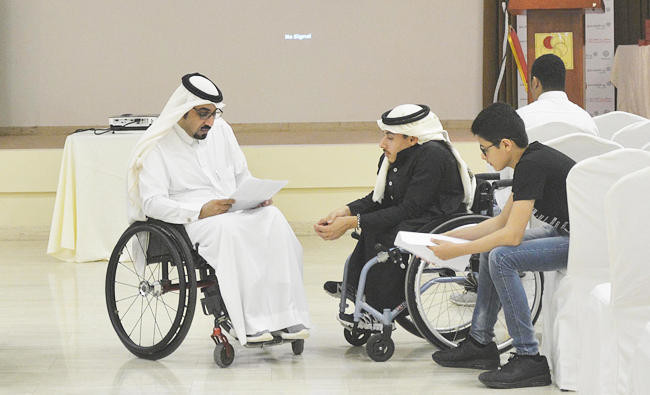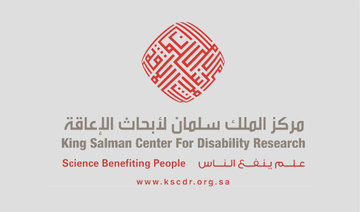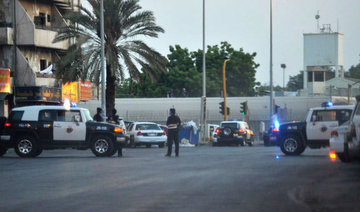JEDDAH: Saudi youth with disabilities were challenged to “Start the Impossible” and fulfil their job potential at a workshop for people with special needs. The workshop in the Abdul Latif Jameel Hospital hall on Monday provided activities and information to help participants recognize their abilities and smooth their path into employment.
The Saudi Abdul Latif Jameel corporation has signed a partnership agreement with the Sa’ee program to employ Saudi youth with special needs and contribute to community development. Sa’ee is a non-profit initiative established this year to find job opportunities and provide training for disabled people.
“We provide psychological support and legal services to help people with special needs blend effectively into the community,” Sa’ee’s founder, Marzoog Al-Otaibi, said.
One workshop participant, Mariam Al-Sulami, 26, told Arab News that cerebral palsy — a movement disorder that appears during childhood — meant she had been unable to attend school every day.
“I had to have surgery 13 times to be able to walk,” she said. “Every summer vacation I had to have an operation on my legs and I would spend six months of the year with my legs in a cast.
“But I was determined to continue my studies — nothing could stop me.”
Al-Sulami earned a bachelor’s degree in business administration and for the past two years has worked as a certified technical and vocational trainer. “I was among the best female students in the city and I received a scholarship to Batterjee Medical College in Jeddah,” she said.
“I was dreaming of studying medicine and becoming a doctor or pharmacist because my GPA in high school was excellent and qualifies me easily to join any medicine school. But when I applied they could not take me into consideration as my appearance is ‘medically unfit,’ so I decided to pursue business administration,” Al-Sulami said.
President of the Physiotherapy Association in Jeddah, Heba Felimban, said: “We are trying to show the community that physiotherapy is one of the best ways to help people get over their disability and live their everyday lives normally, depending fully on themselves.”
Chairman of Abdul Latif Jameel’s car division, Rowaid Al-Sawwaf, said: “We want to provide people with safe transport in accordance with the support the government is giving to help people with special needs overcome any obstacles they face.
Seminar sets disabled Saudi youth on path to work
Seminar sets disabled Saudi youth on path to work

Lavender thrives in Saudi Arabia’s Northern Borders region

- The plant has been observed to grow on the edge of the Nafud Desert, an indication that it could be propagated to fight desertification, says environmentalist
ARAR: The Northern Borders region of Saudi Arabia, a vast area spanning approximately 104,000 square kilometers, boasts a richly aromatic, seasonal, and annual plant biodiversity.
These plants play a crucial role in sustainable development, combating desertification, increasing vegetation cover, stabilizing soil, and fostering ecotourism. Lavender has recently emerged as a prominent species among the region's diverse flora.
Lavender, characterized by its fragrant scent and vibrant purple hue, has been observed on the edge of the Nafud Desert, signaling its potential expansion throughout the region. This emergence highlights the region's ecological significance and capacity to support diverse plant life.
Nasser Al-Majlad, head of the Aman Environmental Association, told SPA that the lavender species is Horwoodia dicksoniae. This annual herbaceous plant features branching stems, typically reaching about 30 centimeters in height, and large, lobed leaves. Its dark lilac flowers, gathered in spike inflorescences, release a distinctive fragrance.
The plant thrives in shallow sandy loam and is valued for its ornamental qualities, making it suitable for cultivation in both homes and gardens. Its smooth brown seeds further contribute to its propagation.
Al-Majlad emphasized the positive impact of nature reserves and the Saudi Green Initiative on the region's ecology. These initiatives have facilitated afforestation, land reclamation, and the protection of wild areas, contributing to the resurgence of numerous trees and plants, including lavender, within the environmental landscape.
Saudi crown prince, French president discuss bilateral relations, regional developments

RIYADH: Saudi Arabia’s Crown Prince Mohammed bin Salman received a call from French President Emmanuel Macron, the Saudi Press Agency said.
The pair also reviewed bilateral relations and cooperation, as well as the latest regional and international developments.
Madinah deputy governor receives Indian minister

Madinah Region Deputy Gov. Prince Saud bin Khalid bin Faisal recently met Indian Union Minister for Minority Affairs and Parliamentary Affairs Shri Kiren Rijiju during his official visit to the Kingdom.
During the meeting, the two sides discussed arrangements for Indian Hajj pilgrims during their stay in Madinah, India’s Ministry of Minority Affairs said in an official statement.
Rijiju also visited the Hajj Terminals at the Jeddah and Madinah airports, and reviewed the facilities available for the arrival and departure of pilgrims as well as baggage handling.
International conference celebrates the camel as a pillar of Arab culture

- Scholars highlight the camel’s role in Arab history and the Arabic language
- Experts from Saudi Arabia and abroad gather in Riyadh
RIYADH: Scholars at a Riyadh conference this week underscored the fundamental role the camel has played in shaping Arab heritage, emphasizing the profound link between camels and the Arabic language.
King Saud University, in partnership with the King Salman Global Academy for Arabic Language, is hosting the Fifth International Conference, titled “Camels in Arab Culture,” which ends on Thursday.
Prominent scholars and specialists from Saudi Arabia and abroad are participating in the conference, which is exploring key topics related to camels, including heritage, history and geography, and archaeological findings.
Hajed Al-Harbi, conference chairman, said: “Honoring camels is a tribute to our deep-rooted values and rich heritage, reflecting our pride in our origins and historical legacy.”
Ibrahim Al-Furaih, conference secretary, told Arab News how the conference underscores the central role camels have played in shaping Arabic literature and intellectual thought throughout history.
“Camels are a fundamental element of our national identity and Arab culture, with a significant presence in our heritage.
“Whether through literature, poetry, inscriptions, or the daily life of early Arabs, they have left an indelible mark. Their influence endures, continuing to shape the lives of Arabs to this day,” Al-Furaih said.
Bedoor Al-Fassam, chair of the public relations committee for the conference, said organizers spent months preparing for the event.
Dr. Al-Fassam, who is also an assistant professor of literature and criticism in the Arabic language department at the university, confirmed that conference participation requests exceeded 300, from which 40 research papers were selected. The submitted papers covered a wide range of fields, including literary, linguistic, historical, and social studies, in addition to anthropology research.
Alongside participants from Saudi universities, the conference features academics from Kuwait, Qatar, Oman, Syria, Lebanon, Egypt, Algeria, Morocco and Canada.
The attendees discussed the definition of camels in language and lexicography, as well as their effect on cultural and national identity.
Additionally, they explored the role of camels in Arabic poetry, narrative storytelling and biographies, highlighting their significance in other literatures and cultures.
The conference further delved into the role of camels in the national economy, addressing sectors such as investment, tourism, and entertainment, in addition to camel festivals, sports and racing events.
Saudi ministry records 7,521 tourism violations

RIYADH: Saudi Arabia’s Ministry of Tourism revealed the results of its third-quarter 2024 inspections, involving 9,655 checks on hospitality facilities and tourism activities across the Kingdom.
During the period, 7,521 violations were identified and 11,494 complaints were addressed, according to the Saudi Press Agency.
Common violations included operating without a license, poor cleanliness, failure to meet licensing conditions and non-compliance by facility representatives.
Makkah had the highest number of inspections with more than 3,600, followed by Riyadh with more than 1,350, Madinah with over 1,100 and the Eastern Province with more than 1,070. The remaining regions accounted for more than 2,500 inspections.
These efforts aim to enhance the tourism sector’s sustainability, ensure compliance with regulations, improve service quality and boost visitor experiences.


















